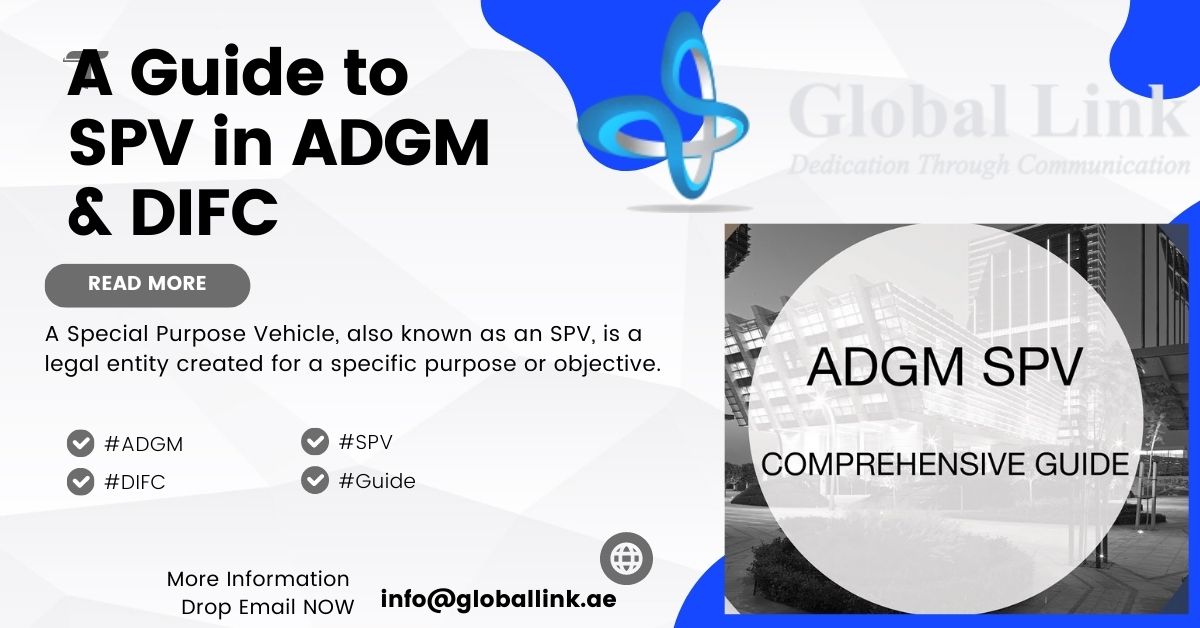A Special Purpose Vehicle, also known as an SPV, is a legal entity created for a specific purpose or objective. SPV’s are commonly incorporated in the Abu Dhabi Global Market (ADGM) and Dubai International Financial Centre (DIFC), for various financial and commercial reasons, including securitization, project finance and investment holding.
ADGM and DIFC are well established financial free zones in the UAE that both offer a range of financial and business services to companies operating in the region. These free zones offer a favorable regulatory environment and low tax rates for companies to conduct their business.
What is an SPV?
SPV stands for Special Purpose Vehicle, which is a legal entity created for a specific, limited purpose. An SPV is typically a subsidiary company that is formed to isolate financial risk and liabilities from its parent company. The SPV is designed to achieve a specific objective, such as raising capital or acquiring assets, and is often used in complex financial transactions.
An SPV is usually created to be a separate legal entity with its own board of directors and management team and is often structured in a way that minimises the impact of its activities on the parent company. By doing so, the parent company can limit its risk exposure to the SPV’s specific project or venture. This is because the SPV is responsible for its own financial obligations and liabilities, and the parent company is generally not held liable for the SPV’s debts or legal obligations.
SPVs are used in a variety of financial transactions, such as securitization, asset-backed securities, and project finance. For example, an SPV can be created to purchase a portfolio of assets, such as mortgages or loans, and then issue bonds or other securities backed by those assets. The SPV is responsible for managing the assets and distributing the cash flows to the bondholders, while the parent company is shielded from any potential losses or liabilities associated with the assets held by the SPV.
What are the advantages of an SPV?
SPVs offer several advantages to investors and companies, including the ability to isolate risk, optimise capital structure and they provide a flexible investment vehicle. They can also be used to raise capital, finance projects, and create investment opportunities.Below are some of the other key benefits:
- Risk management: An SPV can be used to isolate risk from other business operations, which can protect the company from potential liabilities that might arise from a specific project or investment.
- Tax efficiency: Depending on the jurisdiction, an SPV may be able to take advantage of tax incentives and exemptions that are not available to other types of businesses.
- Simplified management: An SPV can be designed to have a simple management structure, which can make it easier to manage and operate.
- Investment opportunities: An SPV can be used to pool funds from multiple investors to finance a project or investment, which can provide opportunities for smaller investors to participate in larger investments.
- Flexibility: An SPV can be designed to have specific terms and conditions that meet the needs of the investors and the project, providing a high degree of flexibility.
- Confidentiality: An SPV can be used to maintain the confidentiality of the investors and the project, which can be an important consideration in certain situations..
How do I incorporate an SPV in ADGM or DIFC?
To incorporate an SPV in ADGM or DIFC, you must first file the necessary documents with the relevant authority. In ADGM, the registration process is handled by the Registration Authority (RA). In DIFC, you can register your SPV with the Dubai International Financial Centre Authority (DIFCA). Both ADGM and DIFC offer a range of legal structures for SPVs, including limited liability companies (LLCs) and exempt companies.
What are the capital requirements of an SPV?
ADGM and DIFC have different capital requirements for SPVs. In ADGM, the minimum share capital required for an LLC is AED 10,000 (approximately USD 2,700). In DIFC, there is no minimum capital requirement for an SPV.
How does tax work in ADGM and DIFC?
In both ADGM and DIFC, SPVs are subject to a zero percent tax rate on profits, capital gains and dividends. This means, at present, if you establish an SPV in ADGM or DIFC, you will not be required to pay any corporate tax on the profits generated by the entity. However, it is important to note that an SPV you must maintain accurate records and file annual returns with the Registrar of Companies.
What are the compliance and reporting requirements?
SPVs in ADGM and DIFC are subject to various regulatory and reporting requirements. These requirements vary depending on the legal structure of the SPV and the nature of its activities. In general, SPVs must comply with the laws and regulations of the relevant jurisdiction, including company law, anti-money laundering (AML) regulations, and financial reporting requirements.
How can Global Link help?
Global Link has over 16 years’ experience working with local and global businesses, providing bespoke consultancy services for company incorporation in Dubai and the wider UAE.
We can advise you on setting up an SPV in ADGM or DIFC and provide support through the incorporation process and beyond, liaising with all relevant parties on your behalf to ensure a swift and seamless setup.
If you need advice on holding companies or for any other company incorporation, visa or PRO service, please get in touch with us on +971 4 553 9901 or email us at [email protected] and we will be happy to assist you.


